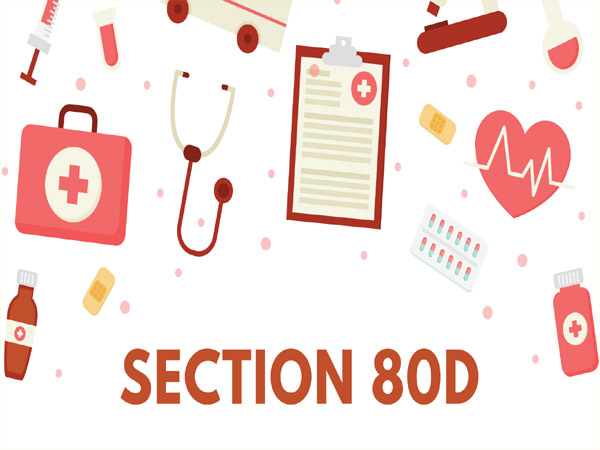A detailed guide on Section 80D Income Tax Deductions
These days, every Indian citizen is opting for diverse ways to save tax and build a strong financial portfolio. The experts often recommend saving taxes by purchasing adequate health insurance policies for yourself and your family members. Under the Income Tax Act, 1961, you can avail of the deduction for medical insurance premium 80D paid for self, spouse, dependents, children, and even parents. Let’s take a deeper look at health insurance tax benefit 80 D and understand how mediclaim deduction under the Section 80D work does.
Health insurance 80D lessens a person’s tax liability by reducing their taxable income. If you pay health insurance premiums for yourself and your family members, this amount will be deducted from your taxable income. However, it won’t be subtracted from your overall payable tax amount. Moreover, health insurance tax benefits offered by Section 80D also depend on the insured person’s age. There are three ways Section 80D works in this respect.
Health Insurance Deduction in Income Tax
- You can save Rs. 25,000 under section 80D of the Income Tax Act by paying health insurance premiums for yourself, spouse, and dependent children. If your parents are less than 60 years of age, then an additional deduction for parents’ insurance plan is available up to Rs 25,000. So, your total deduction is Rs 50,000.
- If your parents are above 60 years old, then you are eligible for a health insurance rebate in income tax. In this case, the deduction amount is Rs 50,000. So, you can initiate a claim of a total deduction of Rs 75,000, from which Rs 25,000 is on the premium you paid for yourself, your spouse, and dependent children and Rs 50,000 on the premium you paid for your senior parents.
- If both the taxpayer and his/her parents are 60 years or above, then you will get the maximum deduction under this section. The deduction amount can go up to Rs.1 lakh (Rs 50,000 + Rs 50,000).
These are health insurance exemptions in income tax that you should know while purchasing health insurance policies.
With health check-ups, you may get additional benefits
Section 80 D of the Income Tax Act also helps you to save on your health check-ups. Early health check-ups are also useful in detecting several diseases at an initial stage. Moreover, regular health check-ups also help you to stay healthy and safeguard you from lifestyle ailments. Many eminent insurance companies embrace policyholders with extensive packages to keep their health in check. The exciting news is that this preventive health check-up also provides a deduction of Rs 5,000 from your income tax liability.
Suppose your health insurance premium amount is Rs 20,000 per annum, and you have opted for a health check-up for yourself, your parents, spouse, and dependent children during the financial year. In that case, you can enjoy a total deduction of Rs 25,000 (Rs. 20000+Rs. 5000 for check-ups) on your income. This benefit offered by health insurance under 80 D is beneficial to manage your income tax smartly.
Tax benefits for indemnity-based plans and defined benefit plans
Let’s look at how health insurance deduction under the income tax act works for indemnity-based and defined benefit plans.
Indemnity-based plans and defined benefit plans are two popular forms of health insurance plans in India. An Indemnity plan is a type of health insurance plan that usually reimburses the actual expense of the insured policyholder during hospitalization (up to the predefined limit). The reimbursed amount depends on the sum insured of the policyholder. A sum insured is the maximum amount of claim that an insurer will pay to the policyholder according to the terms and conditions.
On the other hand, defined benefit plans are health insurance plans that offer the utmost financial safety against critical illnesses (predefined events). If an insured policyholder is diagnosed with any of the mentioned critical illnesses, then he/she gets the entire sum insured from the insurer. Therefore, the benefits of Section 80D are applicable for both these plans.
Suppose you are paying a premium for an indemnity-based plan or a defined benefit plan. In that case, you will be eligible to get the same amount of income tax deduction (for medical insurance deductible) under Section 80D. So, as per your requirements, you are free to choose your health insurance policy and enjoy the tax benefits.
What to consider while purchasing health insurance policies?
Health insurance has become inevitable these days, rather than just an investment. Always purchase a health policy from an established health insurance company. Consider the below-mentioned things while purchasing a health policy.
- Check the claim settlement ratio of the insurer
- Take a look at the network hospitals of the insurer across the country for a cashless treatment
- Easy purchase and renewal procedure
- In-house Health Administration team for a quicker claim settlement process
- 24X7 assistance for claim processes and other health-related queries
Critical illness Policy
You can strengthen your health insurance policy by purchasing a critical illness policy for your entire family. This policy is ideally designed to protect you and your family members against the financial crisis if detected with life-threatening ailments such as cancer, organ transplant, heart attack, etc. In addition, this policy inspires policyholders to equip themselves with a health insurance policy that compensates for critical diseases.
A comprehensive health insurance policy relieves you from financial losses under any ill-fated event or health emergency. Moreover, with the benefits of Section 80D, health insurance policies allow you to minimize your tax liability.




























